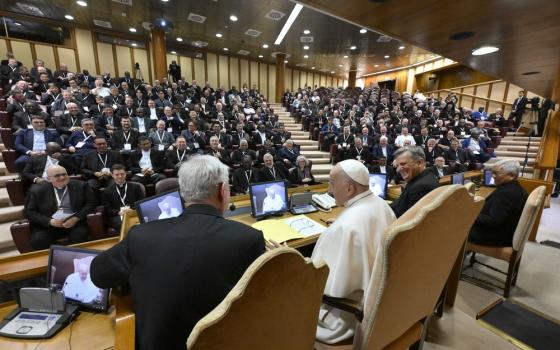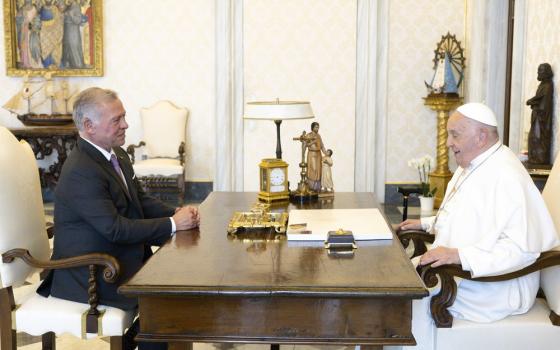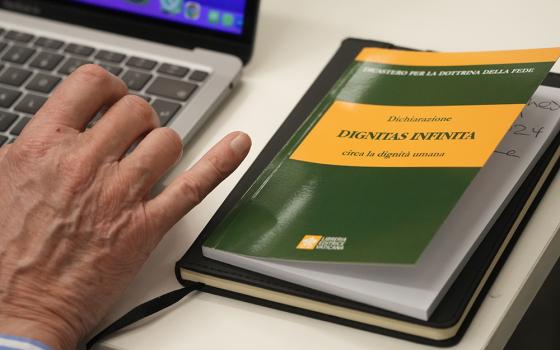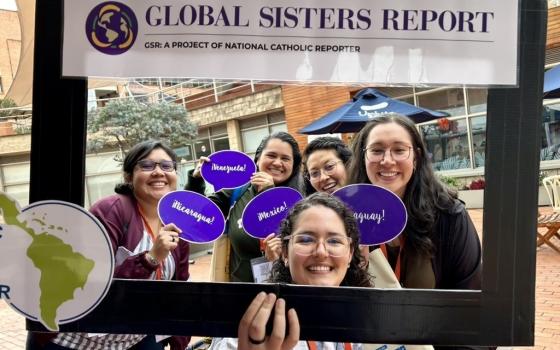Talk of the death penalty is in the air. In early March, the editorial boards of four Catholic publications -- including the National Catholic Reporter -- published a joint editorial calling for an end to capital punishment.
"We join our bishops in hoping the court will reach the conclusion that it is time for our nation to embody its commitment to the right to life by abolishing the death penalty once and for all," the editorial read.
Later that month, Pope Francis issued "his most forceful call yet" against the death penalty, calling it "unacceptable" regardless of the crime committed.
But for a theologian from Summerville, Mass., it became clear that such convictions hold no sway in a U.S. federal court. In January, Bede Bidlack, an assistant professor of theology at St. Anselm College in Manchester, N.H., was dismissed from the jury pool in the Boston marathon bombing case because he refused to support the death penalty, which was being pursued by federal prosecutors against Dzhokhar Tsarnaev, who on Wednesday was found guilty of 30 counts in the case.
NCR recently interviewed Bidlack, who was officially excused from the case on March 4, to learn more about his reasons and rationale for saying no to capital punishment.
NCR: When did you learn you had been selected for the Dzhokhar Tsarnaev case?
Bidlack: When he walked in the room. I had my summons to the federal court. I was surprised by the number of jurors in the room because I'm only used to the local level of jury selection. The potential juror next to me felt that it was going to be for the Tsarnaev case. But I was like, "Ah, I don't know. I'm sure there are many cases going in front of the federal courts." But yeah, when he walked into the room, I was pretty shocked.
Then what happened?
Before he came in, the deputy told us that we were to remain silent and to listen to what the judge had to say. And so the judge addressed us in that initial meeting. And the clerk explained that we would be receiving a questionnaire to fill out -- it was a lengthy questionnaire, like 28 pages -- which we did. And out of about 300 people, there were about 30 other people still writing at the time that I left.
When did you learn the prosecution would be seeking the death penalty?
Immediately, on the questionnaire. It asked us about the death penalty, would we vote for the death penalty. ... I made it clear that I would not vote for the death penalty. And I gave my reasons.
Was it a difficult decision for you to make?
No. I'm fully aware of the issues surrounding the death penalty, and I, being a theologian, am familiar with the papal encyclicals on the matter. The church has a long history of using the death penalty, but in Evangelium Vitae, Pope John Paul II states that while this is true, in our contemporary period, with our modern penal system and our ability to protect the innocent from potential murderers, there is no need to execute to protect the innocent.
In other words, the death penalty is about justice. What we want is a justice system. The question is not whether a murderer, or in this case a bomber, should be killed just as a matter of retribution. It's not about retribution. It's about justice. And if you can protect the innocent and not take the criminal's life, then you should always opt for that.
What is the argument for the death penalty?
Well, one of the arguments is retribution. It's a deterrent. If people know they're going to be executed for their crime, they're less likely to commit it. But I certainly don't think that's the case with Muslim extremists and terrorists. They've demonstrated time and again that they're not really worried about dying. But that said, there's a lot of anger in the Boston area, and justifiably so. This was an act of terrorism. Innocent lives were lost. People here know families who were affected. There are families whose entire lives have changed. I can't imagine losing a limb in a situation like that, much less a life or a loved one. It's horrible.
Just the other day, I was getting a haircut, and someone who was also in the shop said that she felt they should take Tsarnaev and place him in a room with all the victims and beat him to death. That is a very vivid and brutal image of the death penalty. Much different from lethal injection. But I just say that to illustrate the level of anger that people in the area feel.
What do you say to the people who want to see him executed?
I would ask them if they think that would be justice. Would they feel one ounce better? Would more death restore any life? Would it restore any limbs? And it won't.
Is there anything more that you'd like to say?
Well, just that I am against the death penalty. The judge put it this way, under the law: If he's guilty of these crimes, he deserves the death penalty -- so would you vote for the death penalty? And I had to say, in essence, that I think the law is unjust, and so I would not obey the law in this case. That I would not vote for the death penalty, because, again, I don't think it is justice to take the person's life.
[Vinnie Rotondaro is NCR national correspondent. His email address is vrotondaro@ncronline.org.]







